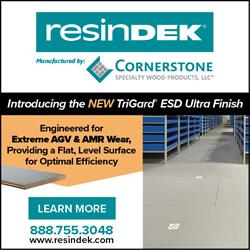3D Printing Startup Fortify Secures $20M in Series B Funding Led by Cota Capital
Funds will be used to scale up manufacturing, the team, and materials development programs
Fortify, a Boston-based additive manufacturing startup, announced today it has closed a $20M equity round led by Cota Capital with additional participation from Accel Partners, Neotribe Ventures, and Prelude Ventures. This round of capital will fuel team growth, accelerate expansion in high-value application spaces, and transition to volume manufacturing of the Flux Series 3D printers.
"The additive manufacturing market is rapidly expanding, and we believe that Fortify is unlocking one of the key barriers to growth of the industry: advanced materials," said Bobby Yazdani, Founder and Partner at Cota Capital. "We are excited to collaborate and support the company as it continues to redefine advanced manufacturing."
Identifying a need for better material properties in 3D printing, Fortify invented Digital Composite Manufacturing (DCM), which combines proprietary systems for mixing and magnetic alignment with digital light processing (DLP) to produce composite parts with optimized mechanical, thermal, and electromagnetic properties. The hardware combined with software, materials development, and processing expertise is opening up new additive manufacturing capabilities by tuning material properties for specific applications.
The team has continued to steadily grow over the past 18 months with most notable hires including Paul Dresens, VP of Engineering, formerly of Desktop Metal, and Advisor Rob Stevens, formerly of GrabCad and Stratasys. The round will be used to accelerate time to market on several high-value strategy material development programs between Fortify and its material partners.
"Fortify has been focused on proving the viability of our product and market opportunity over the past 18+ months, and exceeded our goals set at the beginning of 2020." said Josh Martin, CEO and Cofounder of Fortify. "This next round will expand our go-to-market footprint in key verticals such as injection mold tooling while enabling us to capture market share in end-use electronic devices.
Fortify has previously announced partnerships with Henkel, DSM, Tethon3D, and will be making additional announcements over the course of 2021. Follow Fortify on LinkedIn and subscribe to our newsletter at www.3dfortify.com to stay abreast of upcoming announcements around new partnerships and product releases.
About Fortify
Fortify is transforming the 3D printing industry with its patented DCM (Digital Composite Manufacturing) platform. DCM delivers new levels of additively manufactured part performance by introducing functional additives to photopolymers. By combining a deep understanding of material science with high performance mixing, magnetics, and polymer physics, Fortify is able to produce custom microstructures in high-resolution 3D printed parts. The company is currently focused on applications ranging from injection mold tooling to high performance end-use parts with unique mechanical and electromagnetic properties. Founded in 2016 and based in Boston, Fortify technology enables material properties and components unattainable using other additive or traditional manufacturing processes. For more information, visit www.3DFortify.com.
Featured Product

ResinDek® TRIGARD® ESD ULTRA FOR HIGH-TRAFFIC ROBOTIC APPLICATIONS
To maximize the productivity of an autonomous mobile robot (AMR) or automatic guided vehicle (AGV) deployment, it's critical to create the optimal environment that allows the vehicles to perform at their peak. For that reason, Cornerstone Specialty Wood Products, LLC® (www.resindek.com) created the TriGard® ESD Ultra finish for its ResinDek® engineered flooring panels. The TriGard ESD Ultra finish is ideal for high-traffic robotic applications characterized by highly repetitive movement patterns and defined travel paths.
